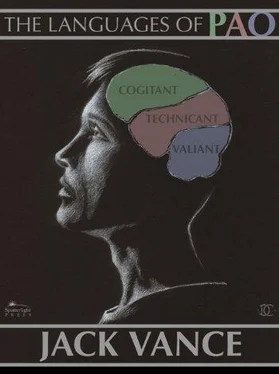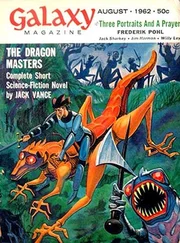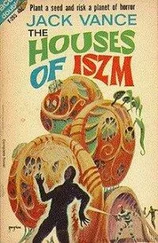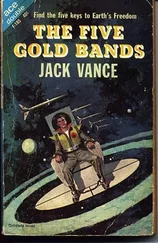Beran somberly rose to his feet looking blindly away from the girl. Seeing himself in his mind’s-eye he grimaced: what a paltry figure he cut! There was nothing to say in his own defense; to plead ignorance and helplessness would be an ignoble bleating. Beran heaved a deep sigh, began to dress himself.
He felt a touch on his arm. Gitan Netsko, kneeling on the bed, smiled uncertainly at him. “Forgive me—I know you meant no harm.”
Beran shook his head, feeling a thousand years old. “I meant no harm, that is true … But so is everything else you said … There are so many truths—how can anyone make up his mind?”
“I know nothing of these many truths,” said the girl. “I know only how I feel, and I know that if I were able I would kill Bustamonte the Tyrant!”
* * *
As early as Breakness custom allowed, Beran presented himself at the house of Palafox. One of the sons-in-residence admitted him, inquired his business, which question Beran evaded. There was a delay of several minutes, while Beran waited nervously in a bleak little ante-room near the top of the house.
Beran’s instinct warned him to circumspection, to a preliminary testing of the ground—but he knew, with a sinking feeling at the pit of his stomach, that he lacked the necessary finesse.
At last he was summoned and conducted far down the escalator, into a wood-paneled morning room, where Palafox, in a somber blue robe, sat eating bits of hot pickled fruit. He regarded Beran without change of expression, nodded almost imperceptibly. Beran made the customary gesture of respect and spoke in the most serious voice he could muster: “Lord Palafox, I have come to an important decision.”
Palafox looked at him blankly. “Why should you not? You have reached the age of responsibility, and none of your decisions should be frivolous.”
Beran said doggedly, “I want to return to Pao.”
Palafox made no immediate response, but it was clear that Beran’s request struck no sympathetic fire. Then he said in his driest voice, “I am astonished at your lack of wisdom.”
Again the subtle diversion, the channeling of opposing energy into complicated paths. But the device was wasted on Beran. He plowed ahead. “I have been thinking about Bustamonte’s program, and I am worried. It may bring benefits—but I feel there is something abnormal and unnatural at work.”
Palafox’s mouth compressed. “Assuming the correctness of your sensations—what could you do to counter this tendency?”
Beran spoke eagerly, “I am the true Panarch, am I not? Is not Bustamonte merely Ayudor-Senior? If I appear before him, he must obey me.”
“In theory. How will you assert your identity? Suppose he claims you to be a madman, an impostor?”
Beran stood silently; it was a point which he had not considered.
Palafox continued relentlessly. “You would be subaqueated, your life would be quenched. What would you have achieved?”
Beran tightened his lips. “Perhaps I would not announce myself to Bustamonte. If I came down on one of the islands—Ferai or Viamne …”
“Very well. Suppose you convinced a certain number of persons of your identity, Bustamonte would still resist. You might precipitate disturbances—even civil war. If you consider Bustamonte’s actions ruthless, consider your own intentions in this light.”
Beran smiled, at last sure of his ground. “You do not understand the Paonese. There would be no war. Bustamonte would merely find himself without authority.”
Palafox did not relish the correction of Beran’s views. “And if Bustamonte learns of your coming, and meets the ship with a squad of neutraloids, what then?”
“How would he know?”
Palafox ate a bit of spiced apple. He spoke deliberately. “I would tell him.”
Beran was astounded—but perhaps only at the top of his mind. “Then you oppose me?”
Palafox smiled his faint smile. “Not unless you act against my interests—which at this time coincide with those of Bustamonte.”
“What are your interests, then?” cried Beran. “What do you hope to achieve?”
“On Breakness,” said Palafox softly, “those are questions which one never asks.”
Beran was silent a moment. Then he turned away, exclaiming bitterly, “Why did you bring me here? Why did you sponsor me at the Institute?”
Palafox, the basic conflict now defined, relaxed and sat at his ease. “Where is the mystery? The able strategist provides himself as many tools and procedures as possible. Your function was to serve as a lever against Bustamonte, if the need should arise.”
“And now I am of no further use to you?”
Palafox shrugged. “I am no seer—I cannot read the future. But my plans for Pao …”
“Your plans for Pao!” Beran interjected.
“… develop smoothly. My best estimate is that you are no longer an asset, for now you threaten to impede the smooth flow of events. It is best, therefore, that our basic relationship is clear. I am by no means your enemy, but neither do our interests coincide. You have no cause for complaint. Without my help you would be dead. I have provided you sustenance, shelter, an unexcelled education. I will continue to sponsor your career unless you take action against me. There is no more to say.”
Beran rose to his feet, bowed in formal respect. He turned to depart, hesitated, looked back. Meeting the black eyes, wide and burning, he felt shock. This was not the notably rational Dominie Palafox, intelligent, highly-modified, second in prestige only to Lord Dominie Vampellte; this man was strange and wild, and radiated a mental force over and beyond the logic of normality.
* * *
Beran returned to his cubicle, where he found Gitan Netsko sitting on the stone window-ledge, chin on knees, arms clasped around her ankles.
She looked up as he came in, and in spite of his depression, Beran felt a pleasurable, if wistful, thrill of ownership. She was charming, he thought: a typical Paonese of the Vinelands, slender and clear-skinned with fine bones and precisely-modeled features. Her expression was unreadable; he had no hint as to how she regarded him, but this was how it went on Pao, where the intimate relationships of youth were traditionally shrouded in indirection and ambiguity. A lift of an eyebrow could indicate raging passion; a hesitancy, a lowered pitch of the voice absolute aversion … Abruptly Beran said, “Palafox will not permit my return to Pao.”
“No? And so then?”
He walked to the window, looked somberly across the mist-streaming chasm. “So then—I will depart without his permission … As soon as opportunity offers.”
She surveyed him skeptically. “And if you return—what is the use of that?”
Beran shook his head dubiously. “I don’t know exactly. I would hope to restore order, bring about a return to the old ways.”
She laughed sadly, without scorn. “It is a fine ambition. I hope I shall see it.”
“I hope you shall, too.”
“But I am puzzled. How will you effect all this?”
“I don’t know. In the simplest case I will merely issue the orders.” Observing her expression, Beran exclaimed, “You must understand, I am the true Panarch. My uncle Bustamonte is an assassin—he killed my father, Aiello.”
Her eyes widened and she leapt to her feet and stared at him for an instant in stunned disbelief. Then—and the gesture seemed as natural to her as breathing—she sank to her knees, placing both of her hands, palms upward, upon his sandaled feet, whispering words of almost worshipful import.
Slowly he bent, and raised her up, shaking his head over and over, “No, no, no.” Then: “You mustn’t. I am only a man—like other men. A man in love.”
Читать дальше







